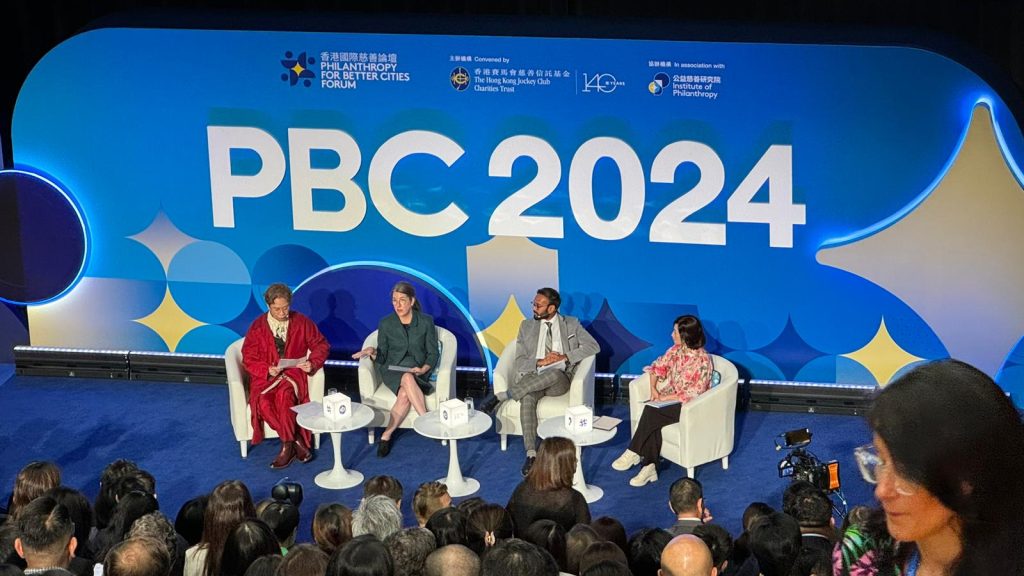The role of the media in promoting meaningful social change often goes unspoken, or often ignored, particularly given the small space philanthropy media occupies in the larger media ecosystem.
But this was a topic that piqued the interest of delegates attending. The hall was packed to the rafters. Clearly there is a demand to hear such open conversations.
Alliance magazine had the honour of participating on the panel, in what was a lively discussion arguably as fundamentally important as the role of artificial intelligence – and other issues – discussed at The Hong Kong Jockey Club Charities Trust’s Philanthropy for Better Cities Forum (“PBC”) 2024.
In a world of news overconsumption, solutions journalism is a best practice that focuses on in-depth exploration of topics through a solutions lens.
Stanford Social Innovation Review (SSIR) global editions editor Jenifer Morgan touched on how changing the lens.
‘There’s evidence that people trust solutions journalism more than traditional news, and it makes them feel less anxious, more connected, and very importantly, more likely to take action,’ she says.
One example of real-world impact is an SSIR article headlined ‘Stop Raising Awareness Already’.
‘The article offers analysis supported by research on why so many advocacy campaigns raise people’s awareness of social issues but don’t lead to action, then presents four strategies for making them more effective,’ says Morgan.
As a panellist myself, I took the view that social change is about being inclusive. Earlier this year, Alliance conducted an independent diversity and inclusion report that found the use of the English language was a barrier of entry for philanthropists and experts in the field who did not speak English.
Alliance magazine has since launched an Inclusion Fund that will pay writers, as well as handle the cost and process of translating articles.
‘This is our way of decolonising philanthropy media. To give space to non-English language experts who can then showcase their stories and expertise. Its a process that has no final result. But in time, it hopefully means a more equitable and ethical way of understanding diversity which we hope will promote social change,’ I told the audience.
Stephen Chan, a well-known presenter for Commercial Radio Hong Kong with his own morning radio show, spoke of the advantages and disadvantages of the age old medium. In particular, the constraints of budgets and time act as constraints to advancing social change. Radio also faced challenges, up against social media and new technologies further fragmenting the audience.
He told the audience that the urge to go viral can sometimes be counterproductive; it’s better and more important to have a targeted message.
Morgan supported the idea of ‘opposing voices, critical analysis of ideas, and fact-checking’ as the bed rock of philanthropy media in the face of misinformation and audience fragmentation.
However, my belief was that objectivity and balance require a deeper understanding, or else they provide a mask for power dynamics.
Lessons are to be learned from the wider, mainstream media. Before my role as news editor at Alliance, I worked at the BBC during the tumultuous Brexit years when Britain left the European Union. The BBC attempted to show a balanced debate. Behind the scenes, producers took 5 minutes to find 60 economists who feared Brexit, and 5 hours to find just one economist who supported.
‘But by the time we went on air, we only had one of each, presenting an unequal effort as if it was balanced. It wasn’t,’ I added.
The panel also discussed how funding models helped or hindered the ability to bring out stories in a fair way.
Chan touched on how news outlets face many operational challenges, including maintaining operating costs amid declining adveritsing revenue, which may lead to sensationalism.
Commercial Radio Hong Kong, however, prioritises social responsibility despite profit motives.
For SSIR, its editorial independence and ability to cover basic operational costs are a strength. However, its need to wait for a grant of a gift to invest in core systems or special projects ultimately hindered the publication, says Morgan.
She refreshingly touched on the financial incentives, or lack of, for philanthropy writers.
‘SSIR stories are mostly written by researchers and practitioners in the field. Contributors are mostly unpaid and usually the people who have the privilege of time and money,’ she added.
The solution? Local-language partnerships and a stipend for authors of a special series on racism to ensure that ‘the perspectives we shared weren’t limited to people in positions of power and white privilege.’
Ultimately, the audience came away (hopefully) with an honest conversation putting people, not technology, at the heart of the conversation.
Shafi Musaddique is the news editor at Alliance magazine







Comments (0)